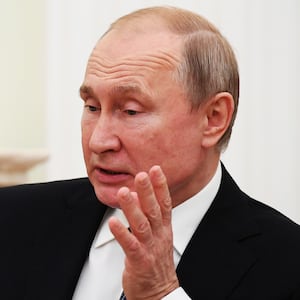MOSCOW—Yulia Galyamina’s unraveling life illustrates all too well the risks of opposition politics in Russia, even on a local level.
Police broke her teeth and jaw and gave her a serious concussion in 2017 when she was caught in a violent street protest. She has suffered from pain in her jaw ever since.
Undaunted, Galyamina struggled this summer to take part in a Moscow City Council election scheduled for September. On Tuesday she called The Daily Beast on the phone from a police van driving her away from the Russian capital to jail in the provincial town of Mozhaisk.
Galyamina is a 46-year-old linguistics professor at a prestigious university here and on the phone she sounded almost as if she were lecturing students about the dying Ketsky language. But clearly she had a message she wanted to get out.
“I have a few minutes left before they take my phone away and cut me off from all communication with my supporters,” she said.
Earlier in the day, a court arrested her and eight other key opposition leaders for calling on protesters to stage a rally in downtown Moscow without government authorization. To support the verdict, the judge read aloud a dozen or so of Galyamina’s Facebook posts about opposition demands to allow independent candidates, including herself, to run in September.
Now from the van she told The Daily Beast, “Putin and [Moscow Mayor Sergey] Sobyanin must be afraid of responsible citizens and I am not surprised to get arrested—I always knew that criminal prosecution would be the price for my opposition activity.”
Putin’s Russia has seen many courageous women fighting against injustice. But instead of embracing their constructive criticism, the Kremlin chose to silence them with police clubs and prison bars. There have also been several brilliant women, including journalist Anna Politkovskaya and activist Natalia Estemirova, who fell victim to assassins. But more women join the demonstrations.
Last weekend, for instance, a 17-year-old protester named Olga Misik sat cross-legged in the street and read articles from the Russian Constitution to riot cops arrayed around her about “the right to assemble peacefully, without weapons, hold rallies, meetings, demonstrations and marches.” The image already is an icon of protest.
Two years ago I visited Galyamina at the Botkin Hospital in Moscow, where she was recovering from a concussion. She had severe headaches after a Moscow OMON (Special Police) cop smashed her face. Then, too, it was striking to see pale Galyamina on the phone from her hospital bed, calling for her supporters to come out to the next rally.
At the time, crowds of demonstrators had turned out in the center of Moscow’s to fight against the city hall’s renovation plan for the displacement of residents from hundreds of apartment blocks slated for demolition. People did not want to move from the central districts to the outskirts of the capital.

“Factories closed, leaving millions without jobs—but at least people had their apartments, their property,” Galyamina told me at the hospital in 2017. “The new law allows the state to deprive thousands of Moscow families of their beloved apartments and move them to wherever officials want.”
Last year Galyamina won a seat in the Moscow municipal elections. Residents of Temiryazevsky region, where she sat on the district council, know their candidate well. She led her electorate in battles about fundamental causes in local politics like saving Dubki Park from development and demanding garbage recycling. She was building her political platform on that public support to run for the Moscow City Duma, a regional parliament, in September this year.
“We spent last month collecting almost 4,000 signatures from Yulia’s supporters but authorities rejected hundreds of real voters to ban her from running for the election,” Nikolay Kosyan, one of Galyamina’s supporters, said. Kosyan was angry, as are many young activists protesting in the streets in support of the arrested leaders. “When the mayoral office realized that we had actually collected real signatures and not fake ones, they still decided to shut her up in fear of her powerful spirit.”
On Saturday Galyamina became a hero for thousands of protesters. Facing rows of National Guard riot police, she said: “You are working for a fascist power, for those who rule for money, not for your sake,” she told men covered in body armor. “The men in power grow fat, while you work for kopecks [pennies]. You beat women, you beat sick people. Do you realize what you are doing?” Galyamina continued in a lecturing tone while the police looked like mischievous, slightly terrified students. (Video here in Russian.)
Galyamina was wearing her usual red dress and a white jacket and was holding a little Russian flag in her hands. “I am a woman, I feel ashamed of you, strong men, who beat ordinary people—these people came out to the streets, because they strive to have independent institutes of power, which would not rob people like you,” the deputy continued. Ten minutes later two policemen grabbed her, twisted her arms behind her back, and dragged her away from the rally.
Back in 2013, the Russian opposition leader Aleksey Navalny won 27 percent in a mayoral election in Moscow, even without access to state television channels, coming in second after the incumbent from the ruling United Russia party, Sergei Sobyanin. This time, apparently, Sobyanin wants to avoid the mistake of allowing a strong opposition showing. Nine key candidates for September election are currently behind bars. So is Navalny.
Galyamina had been playing by the rules. She collected the necessary number of signatures in her support but authorities turned her candidacy down, claiming signatures were falsified. Police detained up to 1,400 protesters on Saturday, Russian courts opened 200 legal cases against the opposition.
“She is stubborn and she is good at creating responsible communities in Moscow,” her friend Denis Bilunov, a political scientist, told The Daily Beast. “The Kremlin is scared of Galyamina.”







